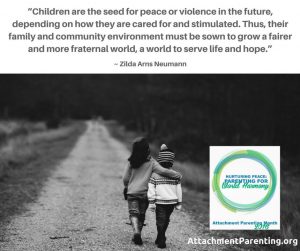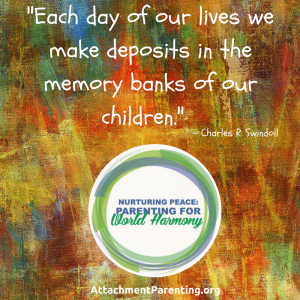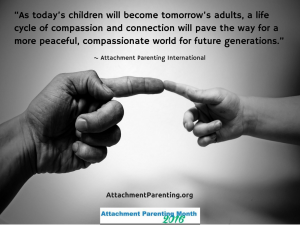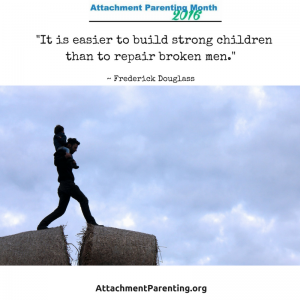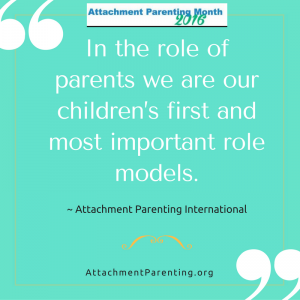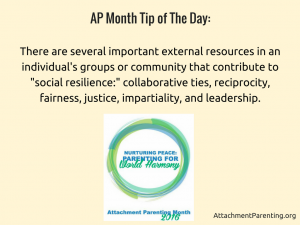Category: Feed with Love and Respect
Each day of our lives…
Nurturing peace, in our parenting and for our world
Editor’s Note: This post was originally published on 10/21/2015. As we celebrate AP Month 2016 with the theme, “Nurturing Peace: Parenting for World Harmony,” this article is a great reminder that a peaceful, attachment-promoting parenting approach promotes a peaceful cycle of living that spreads beyond the home and into the world.
Is world peace possible?
When we talk about the potential for Attachment Parenting (AP) to change the world, we are referring to a ripple effect: Our children growing up to be compassionate and empathic, becoming parents who foster secure attachments with their children, whose children then grow up to repeat the cycle of peaceful living both in and out of the home.
Just as what our society experienced with La Leche League International’s breastfeeding revolution, begun more than 50 years ago, we at Attachment Parenting International (API) hope to be looking at a different kind of society in coming generations — one where disconnection is discouraged and healthy, securely attached relationships are valued above competition and shame.
API is working every day to better support and educate parents on establishing and maintaining secure parent-child attachments. And parents are striving every day to put API’s Eight Principles of Parenting to practice in their relationships with their children.
Many parents understand the challenge of adopting the new mindset needed to fully grasp how API’s Eight Principles of Parenting work. This parenting approach requires looking at the world, your child, your role as a parent and the way you live through a different lens — one that not everyone is able to see. API’s core ethos is a frame of mind that we promote as a practice: respect, empathy, compassion and reflection in thought, speech and action toward yourself and others.
We believe that parents who practice these habits of mind will tend to practice parenting in ways that resemble API’s Eight Principles of Parenting. Likewise, we believe that parents who practice the behaviors included in API’s Eight Principles of Parenting are capable and more likely to practice API’s ethos.
Once you “get” API’s ethos, Attachment Parenting can become much easier, much more “natural.” I liken it to stepping into an alternate reality of sorts. You’re able to view the world, your community, your home, your and others’ relationships in a whole new way and you can then make life choices from a point of compassion, trust, empathy and peace.
Our society tends to shy away from the concept of peace. To many, the idea of world peace is seen to be purely idealistic. We know it as the standard answer of pageant girls competing for Miss America. We also know that there are numerous ways touted to be the answer for world peace, from literacy to racial equality to democracy to certain religions. In reality, for world peace to be attainable, it must take a combination of factors from all levels of society. To many people, that may seem impossible.
Yet peace is what all of our souls crave. It is a sense of contentment, safety and security. It is a joy that doesn’t follow emotional highs and lows, that doesn’t fade when the excitement of instant gratification falls away. Peace allows us to feel centered and to find our balance quickly when we lose our equilibrium. Peace gives us a sense of purpose and control of our life’s direction. When living in peace, people have space in their lives to focus on bettering not only their lives but those around them.
But peace can be elusive. Many people simply do not know how to get to a place of peace in their lives.
For parents who come to API seeking support and education about attachment-based parenting, we offer a way. Secure attachment, promoted through API’s Eight Principles of Parenting, can help families find peace. A person whose attachment needs are met is able to think beyond the basic, day-to-day physical and mental survival and the “need” of trying to keep up with the hectic pace of society, in order to experience greater personal well-being and family enjoyment.
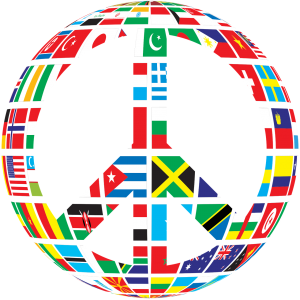 API is doing its part in promoting world peace. We truly believe in our mission to educate and support all parents in raising secure, joyful, and empathic children in order to strengthen families and create a more compassionate world. And we truly believe in parents’ ability to do just that — to raise their children to be secure, full of joy, with the ability to empathize with and show compassion to others.
API is doing its part in promoting world peace. We truly believe in our mission to educate and support all parents in raising secure, joyful, and empathic children in order to strengthen families and create a more compassionate world. And we truly believe in parents’ ability to do just that — to raise their children to be secure, full of joy, with the ability to empathize with and show compassion to others.
As today’s children will become tomorrow’s adults…
It is easier…
The key to world peace and harmony
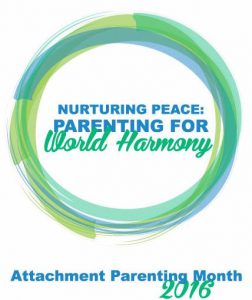 What is the key to promoting peace and harmony in our world?
What is the key to promoting peace and harmony in our world?
In view of all the recent unrest and violence in our country and around the world, it’s a timely and imperative question.
It’s a question I often reflect on. As the mother of two young children, I’ve come to the realization that my role as a parent is not merely to raise my kids to be healthy, happy and successful adults — it’s much bigger than that: it is to raise kids who one day will become adult members of our society. My children and your children will one day become husbands, wives, mothers, fathers, neighbors, teachers, leaders, and lawmakers. With that realization, I feel an immense sense of responsibility.
I believe parenting practices — what parents model as an acceptable and appropriate behavior — has great consequences and implications that cascade beyond the home.
Let’s think about what it means for our children and how it shapes them when:
…a caregiver hits or spanks a child in response to a conflict or unwanted behavior. What messages is the child receiving in regards to managing anger, conflict resolution, and inflicting pain — both physical and emotional — on another being?
…we sleep-train a child — letting them cry themselves to sleep, ignoring their natural need to be soothed and comforted. How may it impact a sibling who is observing Mommy or Daddy not attending to the distressed young child? He may be learning it is acceptable to dismiss one’s need for soothing and compassion.
…the parent-child relationship is based on mutual respect, trust, and collaboration rather than control, manipulation, and fear. How does teaching collaboration and navigating together to reach resolutions prepare a child for future relationships? What does a child learn about handling disagreements when the parent is in the role of the unquestionable authority figure, as in “because I said so!” or “because I’m the boss!”?
…a child joins his mom as a volunteer at a soup kitchen to help others who are less fortunate, or he witnesses his dad stopping at the side of the road to help a stranded stranger.
It means that when we show empathy, we teach empathy; and when we show compassion, we teach compassion.
The child who has been nurtured with empathy and compassion is the child and adult who will extend his hand to another person, not swing his hand. He will be the one who lifts others, not belittles. He will grow to be the adult in society who promotes peace and harmony, not discord, because these are the values and tools imparted in him by his first and most significant role models: his parents.
Echoing in my mind is an incident that took place a few months ago: I clumsily hit the blow dryer against my left eyebrow bone. The sharp pain was agonizing. I clutched my bruise and knelt down to the floor uttering a few groans. My 8-year-old son was nearby. He came over, knelt down, and gently moved my hands and kissed my bruise. “Is it better now, Mommy?” he asked. While trying to hold back my groans, I replied: “A little. Thanks, my love.” He gave me a hug, then inspected the bruise, and said: “Maybe you can do some Reiki on it later.” I was in awe. My eyes were moist — no longer from the pain, but from experiencing the sensitivity and compassion he displayed: He sensed my pain and responded to it with tender sincerity.
In that moment, I was awash with joy and pride, and I thought, this is the kind of adult I aspire to release to this world: one that possesses empathy and compassion for others.
In that ordinary yet profound moment, I appreciated that all of the patience, compassion, responding with sensitivity, and positive discipline I have practiced raising my children. It all paid off in an extraordinary way.
The path to promoting peace and harmony may be simpler and more fundamental than we perceive it to be. It can be more effectively accomplished with the action of planting the seeds, rather than trimming the trees.
 Parents, we are the key: Peace and harmony start with us!
Parents, we are the key: Peace and harmony start with us!
We are the peacemakers and peacebreakers of the world. If we want a more peaceful world for our children and the next generations, we ought to exemplify one for them. If as parents, we model sensitivity, empathy and harmony, our children will carry themselves through life, and react in the same manner when they encounter conflicts and adversities — for these are the tools we have been giving them.
Let’s plant those seeds and watch them grow and spread — one family, one community, one country at a time.

